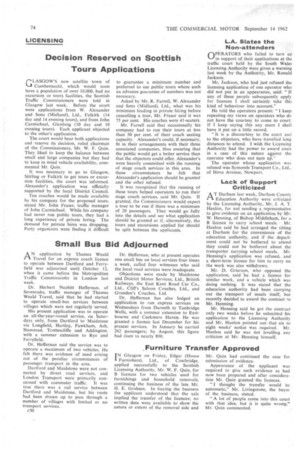Decision Reserved on Scottish Tours Applications
Page 76

If you've noticed an error in this article please click here to report it so we can fix it.
r_LASGOW'S new satellite town of Cumbernauld, which would soon have a population of over 10,000, had no excursion or tours facilities, the Scottish Traffic Commissioners were told in Glasgow last week. Before the court were applications from W. Alexander and Sons (Midland), Ltd., Falkirk (14 day and 14 evening tours), and from John Carmichael, Glenboig (10 day and 10 evening tours). Each applicant objected to the other's application.
The court would hear both applications and reserve its decision, ruled chairman of the Commissioners, Mr. W. F. Quin. They liked to keep the balance between small and large companies but they had to keep in mind vehicle availability, commented Mr. Quin.
It was necessary to go to Glasgow, Stirling or Falkirk to get tours or excursion facilities, the court was informed. Alexander's application was officially supported by the local District Council.
Ten coaches would be made available by his company for the proposed tours, stated .Mr. John Fraser, traffic manager of John Carmichael. While his company had never run public tours, they had a long experience of private hiring. The demand for private hires was dropping. Party organizers were finding it difficult to guarantee a minimum number and preferred to use public tours where such an advance guarantee of numbers was not necessary.
Asked by Mr. R. Farrell, W. Alexander and Sons (Midland), Ltd., what was his minimum loading in private hiring before cancelling a tour, Mr. Fraser said it was 75 per cent. His coaches were 41-seaters.
Mr. Farrell said that occasionally his company had to run their tours at less than 50 per cent, of their coach seating capacity. Alexander's could, if necessary, fit in their arrangements with their three associated companies, thus ensuring that the public would get a better service than that the objectors could offer. Alexander's were heavily committed with the running of stage coach services in this area. In these circumstances he felt that Alexander's application should be granted and the other refused.
It was recognized that the running of these tours helped operators to run their stage coach services, said Mr. Quin. If granted, the Commissioners would expect a tour to be run if there was a minimum of 20 passengers. They would go fully into the details and see what application should be granted or if, alternatively, the tours and excursions applied for should be split between the applicants.
















































































































































































































































